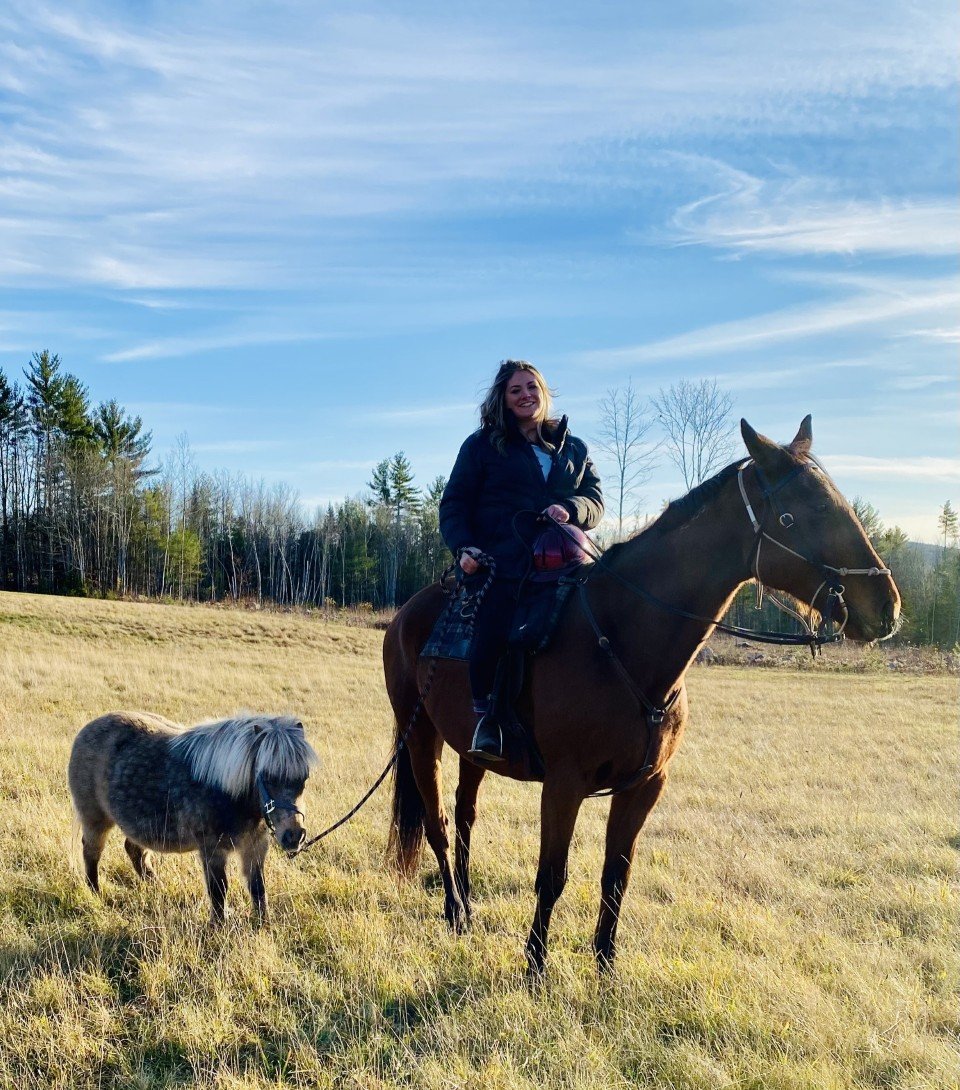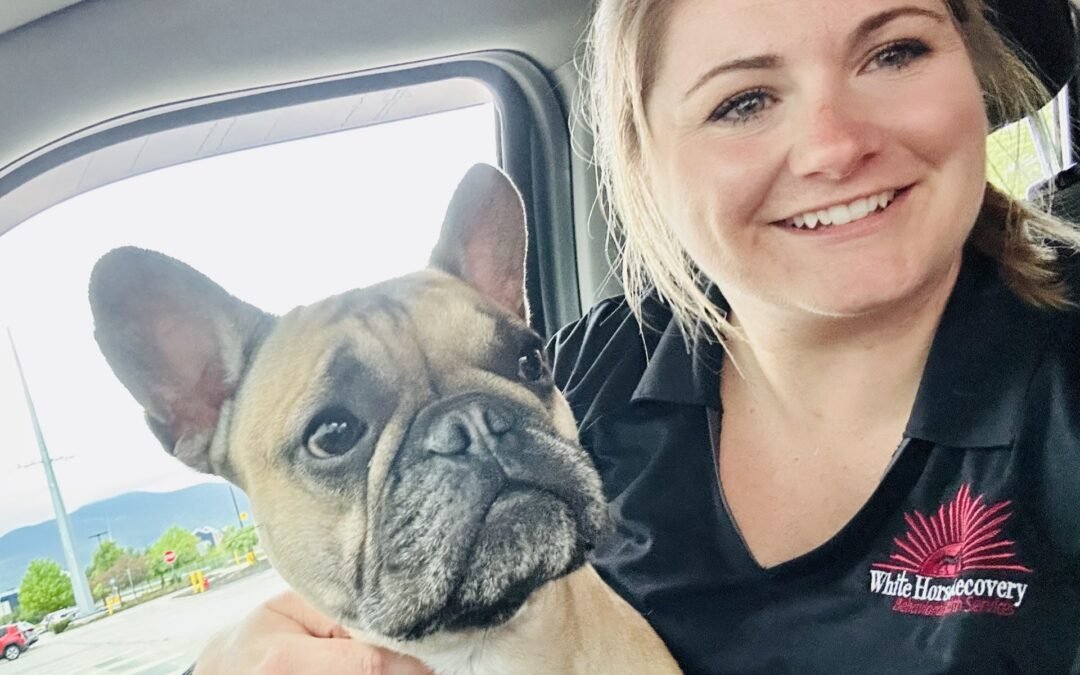Kelsey Wentworth with her dog
Every Thursday, Kelsey Wentworth walks through the heavy doors of Carroll County Jail carrying something most inmates have not seen in a long time: genuine hope. As a Certified Recovery Support Worker (CRSW) at White Horse Recovery, she brings SMART Recovery groups and one-on-one support to people society often writes off.
Kelsey went to jail over 8 years ago in another state for DUI charges. While in jail, she noticed some inmates felt comfortable in jail because their life on the outside was so chaotic. “Sometimes they would choose a jail sentence instead of probation because they did not believe they could stay sober long enough and would end up violating probation,” she says. She also saw little help on the inside for Substance Use Disorder (SUD), of which a majority of inmates suffer, and there was only one AA meeting a week.
That personal understanding motivates Kelsey today. She has been a New Hampshire CRSW for four years and is training to become a Licensed Alcohol and Drug Counselor. Two years ago, while working at White Horse’s walk-in recovery center in Center Ossipee, she partnered with a colleague to launch recovery programming at the Carroll County jail. What started as a simple idea has now become a lifeline for dozens of inmates seeking change.
“The people who come to my groups want to change,” she says. “Inmates really like the Cognitive Behavioral framework of SMART Recovery”
SMART Recovery—which stands for Self-Management and Recovery Training—is a cognitive behavioral therapy-based program that helps participants understand how thoughts affect emotions and emotions affect behavior. The program teaches practical tools for managing cravings, building motivation, and making healthier choices.
“It is sequential to stages of change,” Kelsey explains. “If someone is in the contemplation stage—which a lot of people in jail are—we address motivation first, then look at values.”
“Most people’s values are not achieved through or compatible with addiction to drugs and alcohol, and yet they continue to use drugs and alcohol. We then look at why drugs and alcohol have become a solution for them.”
Her groups are not just about addiction, as she brings in worksheets on relationships, codependency, and abuse. She has also facilitated Adult Children of Alcoholics sessions, which helps people understand how their upbringings continue to influence their lives. The group really decides on what they want to learn more about, and facilitating is based on tailoring to their interests in the scope of recovery from addictions.
“Sometimes, I will have people who want to argue—some come in once or twice,” she says. “Some people admit they are just going there to get out of their cell. Typically, though, these are groups of people who really want help.”

Kelsey Wentworth on horseback
The work is not easy, as Kelsey acknowledged that she experienced something akin to PTSD when she started the program——she was nervous around guards and generally overwhelmed by the environment. She eventually found her footing, however, through connection with the inmates themselves.
“With the inmates, there is camaraderie,” she says. “You show you care, hold boundaries, show respect, and they show respect back. I think they appreciate me more for having lived experience, for having been where they are.”
Kelsey at times facilitates conflict resolution between inmates who wanted to fight, helping them learn to communicate instead. The impact is real and measurable, as she has written letters to prosecutors advocating for treatment over incarceration and helped arrange transportation to residential treatment with coordination through case management at the jail. She has also witnessed people in her groups find recovery, including watching people who started their journey in her jail-based groups attend and graduate from White Horse’s intensive outpatient program after their release.
One story has been particularly powerful for Kelsey: during several weeks when there were very few female inmates, an 18-year-old woman was the only woman at group. She reminded Kelsey of herself – scared and alone after making mistakes while drinking. Kelsey could tell how important the one-on-one time was for her.
“She was in jail longer than I have been all my times combined because of mistakes she made while drinking,” Kelsey says. “I remember looking around and being so scared, thinking ‘Am I going to be okay?’ That is the first thing this woman asked me.”
That young woman is now heading to treatment. Meeting with Kelsey one-on-one helped her make connections about how her drinking related to her anger, which was negatively impacting her life. “I saw my younger self in her,” Kelsey says. “From the time I met her to her departure, I noticed she was more confident that treatment was the next best step for her to learn the skills she needs for long term recovery. Meeting with her allowed her to feel less alone in her experience with alcohol.”
As for the program’s future, it is unclear, as White Horse does not get paid for the jail program, and the County delegation substantially reduced White Horse Recovery’s grant funding during 2025, although Kelsey says she will continue the program on her own time if necessary. “It makes me feel good to go in there—I know I am helping,” she says. “Even if people are in denial, you can sometimes see it in their eyes that they are making connections.”
Looking to the future outside the program, Kelsey dreams of expanding her work into equine therapy (rooted in Gestalt Therapy), particularly for trauma survivors. For now, though, she is content knowing that every Thursday she is planting seeds of hope in a place that needs it most.
“Once I get out of there, I feel really good about doing it,” she says. “I am glad I do it every week.”
If you or someone you know is struggling, you are not alone. White Horse Recovery offers services for those ready to start their journey to recovery. For more information, call 603-651-1441, Ext. 1.

